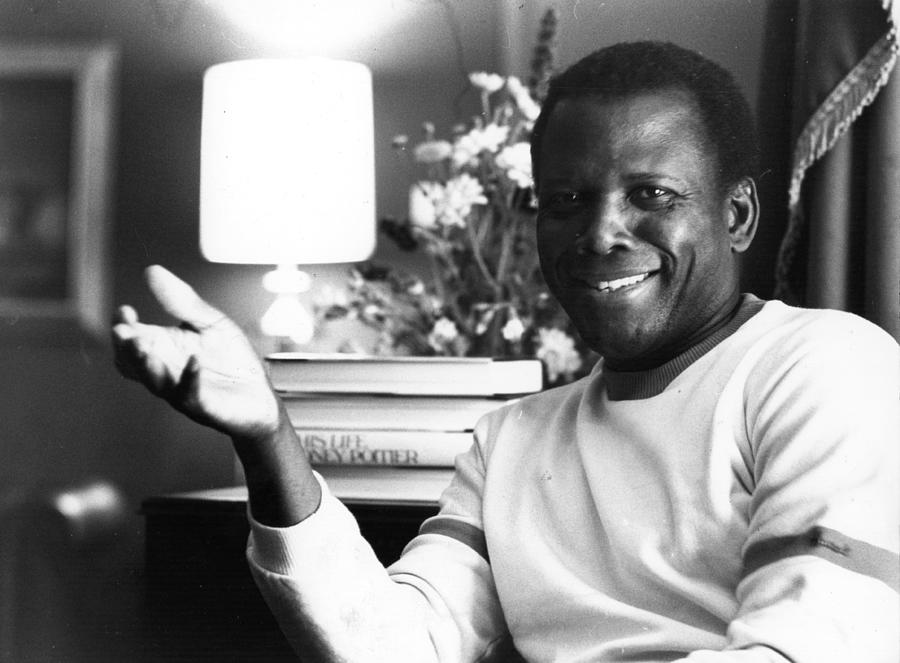“I AM ARTIST, MAN, AMERICAN, CONTEMPORARY...”
Actor. Director. Activist. Writer. Novelist. Producer. Narrator. Mentor. Father. Trailblazer. Legend.
After stumbling upon a wanted ad for actors in the New York Amsterdam News, Poitier, currently working as a dishwasher, auditioned for his first role at the American Negro Theater without any prior preparation in the mid-1940s. After saying the first line of the script he was handed, he was ushered away by the Theater’s owner Frederick O’Neal. He took this moment of shame as an opportunity to refine his acting skills, commit to the craft, learn how to read at a higher level and lessen his Caribbean accent. Poitier returned to the Nego theater a few months later and auditioned for countless roles with little luck. He knew he still needed to refine his craft, and upon noticing the Theater didn’t have a janitor, he worked as a janitor in between classes the Theater offered. He quickly befriended a fellow student named Harry Belafonte who had gotten many of the roles Poitier auditioned for. When Belafonte had to miss a performance at the Theater, Poitier stood in for him. Soon after that, Sidney Poitier got his first breaks in productions of “Lysistrata” in 1947 and “Sepia Cinderella” in 1948. His early-stage success landed him a role in “Anna Lucasata'' in 1948, and the production toured the country throughout the next few years.
His stage work paved the way for his star-turning Hollywood feature debut in the 1950 feature film “No Way Out” (1950), where he played a doctor in an exploration of the day’s racial hatred.
“In "No Way Out," that hated epithet which so far has been ignored as much as Hollywood ignores the Negro in American life is suddenly given its freedom as if shot loose from a Jet projector.” The New York Age exclaims in its 1950 review of the film.
He decided to take roles that only brought dignity and respect to Black Americans with his budding film career. Poitier found his sophomore feature in 1951’s apartheid drama “Cry, the Beloved Country.”
"[Black people] were so new in Hollywood. There was almost no frame of reference for us except as stereotypical, one-dimensional characters. I had in mind what was expected of me, not just what other Blacks expected but what my mother and father expected. And what I expected of myself," Poitier told Oprah Winfrey in a later interview.
His early films helped establish what would become his trademark: An even-headed foil to injustice that often approached boiling over but would never get quite there. He infused grace into scripts that may not have had it otherwise.
In 1955, he landed a career breakthrough as a troubled but musically talented student in “Blackboard Jungle,” a box office hit and cultural touchstone famous for starting the Rock n’ Roll film wave.
“The Defiant Ones” (1958), a moral picture where he’s chained to a racist white prisoner, cemented Poitier as a bonafide star and brought the newly-minted Hollywooder a first: an Oscar-nominated role. He starred in the musical drama “Porgy and Bess” the following year, a part he previously turned down. Throughout this time, he continued to audition for stage plays. He originated the role of Walter Lee Younger in Lorraine Hansberry’s landmark drama “A Raisin in the Sun” opposite Ruby Dee. He revived his “A Raisin in the Sun” role in the screen version.
Poitier’s star power grew as racial tensions across America reached a boiling point in the quickly growing U.S. civil rights movement. Black Americans began to push back on the actor’s on-screen choices.
“As almost everybody knows, Poitier climbed the Hollywood heights by portraying, in general, uptight, long suffering characters who managed to triumph, at least in the realm of spirit.” An Ebony Magazine reporter writes in a 1980 reflection on Poitier, which is emphasized throughout the Black publication’s run.
But as the Civil Rights Movement continued to grow, he insisted that the roles he chose would give Black Americans a fighting chance in the effort.
Poitier’s commitment to justice wasn't just limited to his on-screen characters. One could use his staunch civil rights advocacy as a measure of Poitier’s life. Throughout the Freedom Summer, he spent time in the South, advocating for a commitment to nonviolence in person and the papers. He stood with Dr. Martin Luther King on the March on Washington stage. He testified at a congressional hearing in 1962, exposing the racism in the movie industry.
“I’m probably the only Negro actor who makes a living in the motion picture industry, which employes 13,000 performers,” Poitier told the congressional committee.

In 1964, Sidney Poitier became the first Black actor in a leading role to win an Academy Award for his role in “Lilies of the Field.”
1967 ushered him to the peak of his popularity as he accomplished an unheard-of feat: for the first time, a Black actor was in three of the year’s highest-grossing films in the box office (with “In the Heat of the Night,” “Guess Who’s Coming to Dinner,” and “To Sir, With Love.”)
In Poitier’s own words, his principal concern with directing films was ensuring that Black moviegoers were satisfied. He used imagemaking to use established starpower to direct films he wanted to see.
“When you make a picture for a Black audience, you have to make it with more loving care than you make your average picture. You have to be much more concerned with content and the sensibilities and sensitivities of your constituency. You must be tuned into their aspirations, hopes, and dreams.” Poitier told Ebony in 1977 about his filmmaking.
“Buck and the Preacher”(1971), his first directorial effort, a western starring Poitier, Ruby Dee, and Harry Belafonte is one of the first studio films that openly questions the inhumanity of Whiteness and takes action against it.
His other directorial efforts like “A Warm December” (1977), and “Uptown Saturday Night” (1974) show Poitier’s commitment to understanding the sensitivities of his constituency.
As the 70s made way for the 80s, Poitier continued to act, direct, and produce artistic works. In 1980 he published a revealing memoir about his life. In 2002, he was awarded an honorary Oscar.
To sum up Sidney Poitier’s contributions to the art of cinema is an impossible task. To remember him is to celebrate his beauty, charm, generosity of spirit, and the space he was able to carve out for himself and countless others with the weight of representation on his back.
1967 ushered him to the peak of his popularity as he accomplished an unheard-of feat: for the first time, a Black actor was in three of the year’s highest-grossing films in the box office (with “In the Heat of the Night,” “Guess Who’s Coming to Dinner,” and “To Sir, With Love.”)
In Poitier’s own words, his principal concern with directing films was ensuring that Black moviegoers were satisfied. He used imagemaking to use established starpower to direct films he wanted to see.
“When you make a picture for a Black audience, you have to make it with more loving care than you make your average picture. You have to be much more concerned with content and the sensibilities and sensitivities of your constituency. You must be tuned into their aspirations, hopes, and dreams.” Poitier told Ebony in 1977 about his filmmaking.
“Buck and the Preacher”(1971), his first directorial effort, a western starring Poitier, Ruby Dee, and Harry Belafonte is one of the first studio films that openly questions the inhumanity of Whiteness and takes action against it.
His other directorial efforts like “A Warm December” (1977), and “Uptown Saturday Night” (1974) show Poitier’s commitment to understanding the sensitivities of his constituency.
As the 70s made way for the 80s, Poitier continued to act, direct, and produce artistic works. In 1980 he published a revealing memoir about his life. In 2002, he was awarded an honorary Oscar.
To sum up Sidney Poitier’s contributions to the art of cinema is an impossible task. To remember him is to celebrate his beauty, charm, generosity of spirit, and the space he was able to carve out for himself and countless others with the weight of representation on his back.
1961 interview.
1968 press conference where Poitier questions the intentions of journalists.
Sidney Poitier’s 2013 CBS “Sunday Morning” interview.
![]() “I did not like my life as an actor. I am just not my kind of actor.” A clipping from a poignant 1961 interview in Newsweek. His first directed work wasn’t until a decade later.
“I did not like my life as an actor. I am just not my kind of actor.” A clipping from a poignant 1961 interview in Newsweek. His first directed work wasn’t until a decade later.
Sidney Poitier’s 2013 CBS “Sunday Morning” interview.
 “I did not like my life as an actor. I am just not my kind of actor.” A clipping from a poignant 1961 interview in Newsweek. His first directed work wasn’t until a decade later.
“I did not like my life as an actor. I am just not my kind of actor.” A clipping from a poignant 1961 interview in Newsweek. His first directed work wasn’t until a decade later. 
